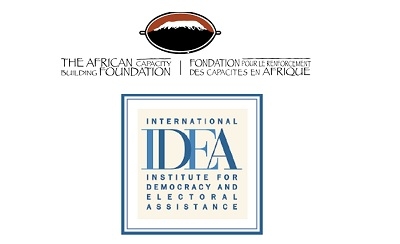
Stockholm, Sweden, 2 June 2017 (ACBF) – Development experts at an exciting presentation of African Development Foundation’s Africa Capacity Report (ACR) 2017 in the Swedish capital this week expressed their strong desire to appropriate the findings of a just-started research endeavor by the Foundation into how transformative leadership would make a difference for Africa’s economic leap-forward. The point for transformative leadership came up strongly following interrogations on why Africa is performing very low on science, technology and innovation (STI) as explicitly captured by ACBF’s 2017 flagship report with an eponymous theme.
The debaters, comprising academics and development practitioners were brought together by the African Capacity Building Foundation and International IDEA to dissect the implications of ACR 2017 for Africa from both a domestic and international dimensions, under the leadership of Professor Emmanuel Nnadozie – Executive Secretary of the Foundation, and Ms Keboitse Machangana – Director of International IDEA’s Global Programme.
“We totally agree with ACBF’s findings that Africa is low on innovation.
“However, we must not forget that our youths are innovative but politics is the main thing getting in the way of innovation,” pointed out a debater who said Africa must allow leadership space for its youth if it must leap-forward through innovation.
Prof. Emmanuel Nnadozie noted the merits of this reasoning, saying “we must be paying attention to the politics of development otherwise we will be wasting our time” in Africa’s quest for transformation, pointing out, though, that a lot of African governments have begun paying attention to this necessary dimension for their countries’ development.
“Let us see the glass as half full and nudge the continent’s leaders to do more,” he reasoned, after receiving accolades for ACBF’s cutting edge work of the from International IDEA’s Global Programme lead – Ms Keboitse Machangana.
“We are very glad that ACBF is adopting a regional approach in examining how well Africa is doing with STI’s for development in an interconnected world,” said Ms Machangana, who re-echoed the findings of the 2017 Report that most African Governments have STI policies but are totally wanting in terms of implementing them.
And the key reason for this lack of capacity to implement lofty plans was found in the continent focusing on the wrong areas in which to train its youth in.
“We are not educating Africa’s youths to solve Africa’s problems,” said a rather blunt Prof. Nnadozie who once again questioned why African universities were churning out about 80 to 90 per cent of graduates from the arts and humanities whereas science, technology and innovation are the drivers of development. Little wonder therefore that the continent has a gaping need for 4.3 million more engineers to be able to make any progress with the first ten year plans of the African Union Agenda 2063 which has similar development sign posts with the more global Sustainable Development Goals.
The strong message was therefore for Africa to put its resources in the rightful types of training in STI in order to make the transformation that it seeks.
In working consistently to show African States the pointers to where they need to build capacity to leverage their development policies, ACBF, Prof Nnadozie said, is opening its doors to welcome more partners to help Africa implement the recommendations of its STI-related flagship Report (presented in Stockholm) and also for gathering the evidence towards the next edition of the flagship (the Africa Capacity Report). The forthcoming Report will harp on transformative leadership as a key ingredient towards an African economic revolution – a publication which the Stockholm debaters said they were highly waiting for, to take the debate on Africa’s innovative capacity for development to the next important level.
The launch of the Africa Capacity Report 2017 in Stockholm, served as a continuation of a series of launches that took place across Africa last March to bring the policy recommendations of the Report to the attention of policy makers, academics, civil society, private sector leaders and the media. Copies are available for free download on www.acbf-pact.org.
-ENDS HERE-
For more information, please contact:
Abel Akara Ticha – Senior Communication Officer
The African Capacity Building Foundation
Harare, Zimbabwe
+263 7+263-4 304663, 304622, 332002, 332014; Ext. 279
Email: A.Ticha@acbf-pact.org
About the African Capacity Building Foundation
Established in 1991, ACBF builds human and institutional capacity for good governance and economic development in Africa. To date the Foundation has empowered people in governments, parliaments, civil society, private sector and higher education institutions in more than 45 countries and 6 regional economic communities. ACBF supports capacity development across Africa through mobilization and leveraging of resources for capacity development; grants, investments and fund management; knowledge services; promoting innovation in capacity development and capacity development advisory services. The establishment of ACBF was in response to the severity of Africa’s capacity needs, and the challenges of investing in indigenous human capital and institutions in Africa. ACBF interventions are premised on four principles: the centrality of capacity to the development process in Africa; the critical role of a partnership and demand-driven approach in tackling capacity challenges; African ownership and leadership in the capacity development process; and a systematic, sequenced and coordinated approach to the capacity development process that pays attention to capacity retention and utilization. For further information go to: www.acbf-pact.org





